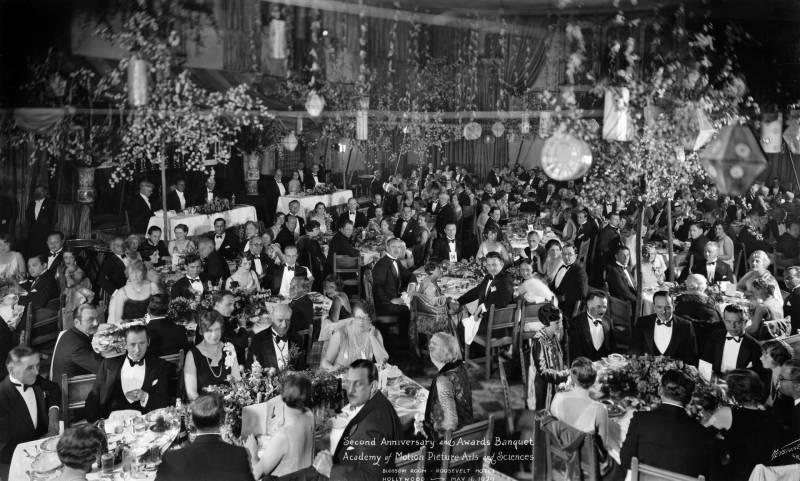Someone else accepted the award on his behalf. “Then no one could find this guy. And that’s because he did not exist,” says Michael Schulman, a staff writer for the New Yorker and author of the new book Oscar Wars: A History of Hollywood in Gold, Sweat, and Tears.
Robert Rich was a pseudonym for screenwriter Dalton Trumbo, who was imprisoned for defying the House Un-American Activities Committee.
“He realized there was a contradiction, that all of these people — suspected communists — were blacklisted, and yet they were all working,” says Schulman. “They were writing movies under fake names, and now they were winning awards.”
Schulman says that was one of the many Hollywood scandals the Oscars have exposed.
In 1953, the Oscars began being broadcast on television, with host Bob Hope, who quipped, “Isn’t it exciting to know that a lot of these glamorous stars are going to be in your homes tonight? Television, where movies go to die.”
The ceremonies are notorious for running long. But in 1959, the show ended up 20 minutes short. So emcee Jerry Lewis had to ad-lib with shticks and bits to fill the airtime.
“We would like to now do 300 choruses of ‘There’s No Business Like Show Business,’” he said before taking the baton to lead the orchestra at the Pantages Theatre.
“Lewis invited all of the winners and participants from the show back up on stage, and they’re feeling like idiots. So they started dancing with each other,” chuckles Davis. “And still, it wouldn’t go off. Then people start sneaking off the stage.”
For the remaining minutes, NBC cut to a rerun of a sportscast.
Davis says one of the most poignant moments in Oscars history was when Charlie Chaplin, who had started in silent movies, won a lifetime achievement award in 1972.
“He had been almost driven out of the country because his politics were seen to be too far left for the American public,” says Davis. “So to have him come back to receive an honorary award and be embraced by the entire industry was clearly a very moving thing.”
The audience gave Chaplin a 12-minute standing ovation.
The following year, the crowd booed when Marlon Brando sent Sacheen Littlefeather to the stage to decline his best actor award because of “the treatment of the American Indians” by the film industry.
Years later, Littlefeather recalled being escorted offstage at the Oscars by security guards. She said that for years Hollywood boycotted her, calling it being “red-listed.” Finally, nearly 50 years later, the Academy officially apologized to Littlefeather for the abuse she subsequently endured because of her Oscars appearance.
In 1974, the Oscars audience shrieked when gay activist Robert Opel dashed across the stage naked. The streaker prompted presenter David Niven to quip, “Probably the only laugh that man will ever get in his life is by stripping off and showing his shortcomings.”
In 1985, best actress winner Sally Field gave one of the Oscars’ most unforgettable speeches. “I can’t deny the fact that you like me,” she gushed. “Right now, you like me!”
Schulman says there have been other cringe moments, like the opening number in 1989, which included actor Rob Lowe singing a duet with a live-action Snow White.
Schulman says the 11-minute, over-the-top opening was a flop for flamboyant producer Allan Carr, who had previously produced the musicals Grease and La Cage aux Folles.
“When it went bad, there was a scapegoat effect,” says Schulman. “He was essentially ostracized within days. And he never recovered. It destroyed his career. It destroyed his life.”
In the last decade, the Oscars had a racial reckoning after being criticized for not giving awards to actors and filmmakers of color. The #OscarsSoWhite movement led to this 2017 mixup:
“There was a rookie from Pricewaterhouse that year who was a little too enthusiastic about being backstage with all of the stars and clearly took his mind off his job,” explains Davis. “He handed the presenter the wrong envelope.”

9(MDAxOTAwOTE4MDEyMTkxMDAzNjczZDljZA004))

